About a year ago it came to my attention that while I am actually pretty darn well educated in anime that deconstructs the tropes of "magical girl" stories, I'd not actually seen any magical girl anime. That's how I ended up mainlining episodes of Sailor Moon with my endlessly patient and lovely best friend Kyla Furey, and we all know how that turned out. But Sailor Moon was not enough. After a few months of watching other stuff and going outside and doing things occasionally, Kyla and I figured that it was time for me to watch the second most important magical girl anime: Cardcaptor Sakura.
Admittedly, this took us a while.
At first we just kept getting distracted by my desire to watch reality shows about people who renovate houses*, but once it became clear that our time was limited and I would be leaving our gentle and wonderful apartment home within the month, we decided to haul butt and try to finish the whole show.
Which we did. Go us. So now, having seen all seventy episodes of Cardcaptor Sakura, I feel not only more educated about magical girl anime, but also more enlightened as a human being. I guess. Mostly I feel kind of sad that it's over because it turns out that Cardcaptor Sakura is exactly my speed.
What I mean when I say that is that this show, for all its silliness and wacky hijinks - and for all that it was intended for an audience of ten year olds - is very much philosophically in line with what I want from a good TV show. It's a show about a magical little girl saving the world, sure, but it's also a show about this little girl growing up and coming to terms with her emotions.
In fact, more of the show is about Sakura's emotional development than is about her magic. The series finale occurs after all of the magical plotlines have finished up and is actually just about Sakura dealing with her feelings. And I love that.
So, to back up a bit, Cardcaptor Sakura is a Japanese animated show that aired between 1998 and 2000. It's also a manga but I haven't read it, so we're just talking about the show here. Like a lot of anime of the late 1990s, it was optioned and brought over for an American audience. But because American creative executives are kind of awful sometimes, the show was very heavily edited and renamed Cardcaptors, making one of the more minor characters, Li Syaoran, the other main character because the producers were worried about bringing over a show that was too "girly." You know, because who watches cartoons about girls?
Me. I do.
Anyway, the version that Kyla and I watched was the original Japanese version (with subtitles), and I have to say that it was really good. The story starts when Kinomoto Sakura, a cute nine year old girl, finds a mysterious book in her father's office. The book is covered in symbols and English words. When Sakura shakily reads out one of the words - WINDY - the book flies open and all of the cards inside fly up into the air. It's then that Sakura realizes that the book is actually magic. Fortunately for her (probably), the cards' guardian, Kero, shows up in that moment to tell her what has happened.
The cards are magic. They're like magic spells distilled into cards. When Sakura opened the book and scattered them, because she has latent magical power, they all woke up and now they're wreaking havoc on her town. It's up to Sakura to find the cards and defeat them so that they will stop making mischief. In order to do that she gets a magic wand and a bunch of coaching from Kero.
The first half of the show then follows Sakura as she tracks down each card. It falls into a cute little formula where the stakes vary wildly. In one episode, Sakura discovers that the JUMP card is hiding out at a cute little toy shop and causing problems for the owner. Said owner thinks she's being haunted by an evil spirit. In another episode, Sakura and her entire class nearly die of hypothermia when the ICEY card attacks them at a skating rink. And then there's the episode where Sakura has to defeat the card SWEET because it's making all the cakes they bake in home-ec class too sweet.
In other words, the show is kind of all over the place in terms of stakes. But Sakura tackles all of her problems with an open and cheerful attitude. Even when another student (Li Syaoran) transfers from Hong Kong to go after the cards as well - and prove that he's a more powerful magician than Sakura is - she keeps her upbeat, happy heart. Sakura's story isn't defined by antagonists she has to defeat, but rather by her emotional development in and of herself. The cards she fights quickly become her friends. Syaoran spends a few episodes resenting Sakura, then becomes her friend, and eventually develops feelings for her. Heck, she basically has a coterie of people following her around throughout the show making sure nothing bad happens to her.
What makes this show worth discussing (and watching, for that matter) is how it manages to create a main character who is fully good and kind and friendly and wonderful, and then show how this does not make her a less powerful person at all. It's a polemic about the importance of virtue in people with power, and it deals with complex and frightening issues without ever losing the light, joyful tone of the show. In other words, it's freaking magic.
Not only that, but when it gives her a vision of the future where she doesn't become the master of the cards, the consequences aren't so much apocalyptic as they are personal. The horrific world ending future Sakura has been warned about is really just one where everyone has lost the spark of love for the person they care most about in the world.
In other words, the magic on the show is really just a means to an end, and that end is the exploration of Sakura's rich and complex emotional life. All of the magical stuff that happens in the show plays second fiddle to the development of relationships and characters and the complicated reality of growing up.
This is a show that by and large doesn't have any actual bad guys. Even the guys you think are bad guys turn out to have their own slightly weird but generally understandable logics for what they do. You never really worry while watching the show whether or not Sakura will be all right. Of course she'll be all right! She's always all right. The question then becomes not if she'll be okay but how she will deal with her own emotions and the emotions of those around her. And that becomes a much more interesting show.
In addition to all of this, we slowly learn that Sakura's parents had a very unconventional relationship. Meeting when Fujitaka was a student teacher at Nadeshiko's high school, they married very quickly and had Toya within the year. Nadeshiko's whole family hates Fujitaka to the point of having cut him and his children out of their lives entirely. It's not until well into the series that we discover Nadeshiko's family is still around and even then the story never gets fully resolved.
Then there's Sakura's relationship with her best friend Tomoyo. Tomoyo is the first person to figure out that Sakura has magic powers and decides that the most reasonable reaction to this is to demand the right to videotape all of Sakura's escapades. Tomoyo is a wonderful, sweet girl, but also clearly obsessed with Sakura. This only becomes more intense when we discover that Tomoyo and Sakura are actually second cousins - Tomoyo's mother, Sonomi, was Nadeshiko's cousin.
As the series progresses, it becomes clear that Tomoyo has feelings for Sakura, feelings that she never tells Sakura about because she knows that Sakura will not reciprocate. Again, this emotional complexity is much more at the forefront of the show than any of the magical stuff.
I've already mentioned how Syaoran goes from being Sakura's rival to her love interest, but even his story is more complicated than that. He himself is arranged to be married to his distant cousin Meiling, a relationship that seems based more on proximity and their weird family than anything else. Meiling finds Sakura to be a huge threat to their relationship, but eventually decides that she can't hate Sakura. Sakura is just too nice. So instead of some typical love triangle where one character is obviously bad and mean and the weak link, we end up with this complex tangle of lines and feelings where no one is bad and there is no easy answer.
I'm not even going to get into the deal with Toya and his best friend Yuki - because that's a whole article right there - but I will say that Sakura spends most of the series with an abiding crush on Yuki, only to discover at the very end of the series that he views her as a little sister and actually has feelings for her brother. Again, this emotional development is the focus of several episodes and is never treated like it's trivial or meaningless. Because it's not.
That's the point I'm trying to get at here. The real value of Cardcaptor Sakura as a show is that it treats all of these emotions and relationships as being the important part of the story. Because they are. Sakura's story isn't about her magical powers, it's about her maturing and growing up. It's a coming of age story and how she begins to have the kind of complex emotional life that we all get to enjoy in adulthood.
The emotions aren't a distraction from the story in Cardcaptor Sakura, they are the story. And that's great.
I think that this is a show that really and truly matters. It takes a character who is at an age we all kind of tend to ignore - just on the cusp of puberty and adolescence - and deeply examines her emotional life. That's not nothing. In examining Sakura's feelings and her relationships with the people around her, the show validates those feelings. No one tells Sakura that she's too young to have a crush on Yuki or that she's too little to be feeling so conflicted about her family. Because she's not. Sakura's feelings are always treated as valid by the show, and I can only imagine how encouraging that must be for all the young kids watching.
"You're not too young," the show seems to be saying to its audience. "You're capable and you have a rich emotional life. That's okay. Feelings aren't just something that happen when you grow up." What's even more fantastic about this is how it presents Sakura always thinking through her emotions and trying to do what's best for herself and for those around her. It really emphasizes the idea that just because we feel things deeply doesn't mean we can't also be responsible with what we feel.
I really think that Cardcaptor Sakura sets a remarkable example for little kids, showing them how to grow up and come of age with grace and dignity, and how to deal with your feelings in a positive and healthy way. There really can't be too many portrayals of that in the media. Pretty sure it's impossible.
So whether you're nine or fifty-nine, I highly recommend spending some time with Sakura and her gigantic heart. For one thing the show is going to make you feel all warm and squishy inside. But for another, you'll get to see a portrayal of a kid who is definitely still a kid but also one of the most complex and realistically drawn characters I've seen in a long time.
Even if she is a magical girl who occasionally grows wings.
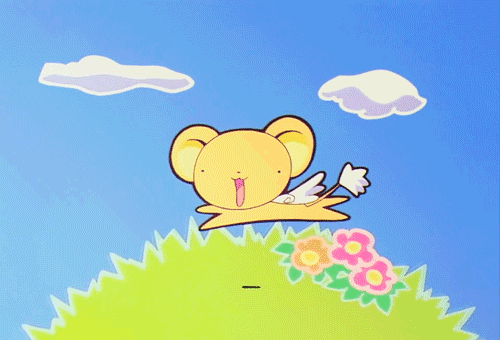 |
| Obligatory bouncing Kero. |



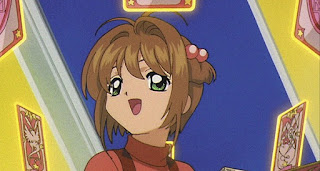
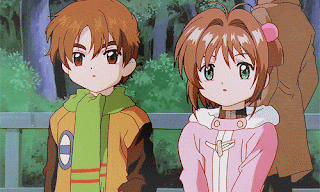
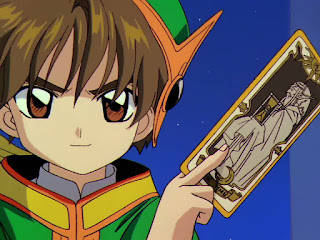
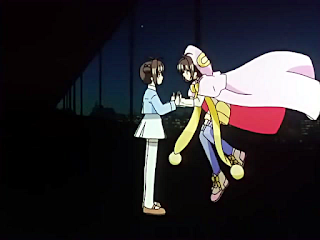
YAY. When I commented a few hours ago on your other post, I wasn't expecting to get to see a magical girl anime review so soon. Cardcaptor Sakura is my absolute favorite. Sailor Moon and Cardcaptor Sakura are the two reasons I got into anime. Plus, I also marathoned the entire series within the last year ^^
ReplyDeleteWon't lie: every time I see you've written a post about one of my favorites (be it a show, movie, or whatever), I get a little nervous. You point out a lot of not-so-great things, which I appreciate, but which can be hard to realize.
But Cardcaptor Sakura is seriously wonderful, and I'm so glad you feel the same!
Internet high five for massive Cardcaptor Sakura marathons! Between this and Sailor Moon I feel like all my happy magical girl needs are being met quite adequately.
DeleteAnd, yeah, you're not the first person to tell me they get a little worried when I set my sights on something! :P It's okay. I know I can be a harsh and cruel critic. But Cardcaptor Sakura is genuinely delightful and that makes me so happy inside! I'm glad you concur. :DDD
Deborah, have you seen the two Sakura CardCaptor movies?
ReplyDeleteI have to admit that I haven't! Kyla didn't see them as necessary for an understanding of the canon and we were a bit pressed for time. :)
DeleteMay I suggest that you eventually see the second film?
DeleteIt shows events after the final episode, so is basically a conclusion for the franchise.
FEMALE CALL GIRLS KOLKATA
ReplyDeleteFEMALE CALL GIRLS
SEXY CALL GIRLS SERVICE IN KOLKATA
ESCORTS SERVICE IN KOLKATA
KOLKATA FEMALE ESCORT SERVICE
TOP ESCORTS SERVICE KOLKATA
BEST KOLKATA ESCORTS SERVICE
CALL GIRLS SERVICE
ESCORTS SERVICE
ESCORT SERVICE
ESCORTS SERVICE IN KOLKATA
BENGOLI ESCORTS GIRLS
BENGOLI CALL GIRLS KOLKATA
KOLKATA ESCORTS SERVICE
FREE ESCORTS SERVICE KOLKATA
FREE WHATSAAP NUMBER ESCORTS
FREE WHATSAAP NUMBER OF CALL GIRLS
PHONE NUMBER OF ESCORTS SERVICE
FREE PHONE NUMBER ESCORTS SERVICE
MOBILE NUMBER OF ESCORTS SERVICE